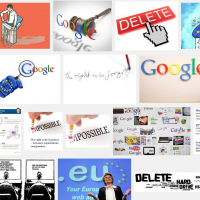The recent verdict by the European Court of Justice is on a lot of people’s minds. If Google shows irrelevant results when you search a person’s name, that person can request to have those results omitted — provided that the search string was their name. Is that an improvement of the right to privacy, or a deterioration of the right to freedom of speech and free access to information? Or is it both — and if so, which of them should prevail?
For the Spanish man who sued Google because an announcement from 1998 saying his house was being sold to cover social security debts kept haunting him in Google’s search results, the right to be forgotten was a welcome solution. The 16 year old message that anyone searching his name would see was a constant reminder of his dark past, but will now no longer appear. His story is a perfect example: the information being shown was clearly no longer relevant, and yet very harmful to him. But what about the hundreds of thousands of other requests Google has received since the verdict? Can we expect a company like Google to make the right choice in every single case, with such a thin line between relevant and irrelevant, privacy and censorship? Who keeps it in check?
By now, Google has started carrying out the judges’ verdict. The owners of the pages involved are notified by email and, of course, aren’t told what search string the blockade applies to, i.e. who filed the request. Because that could give rise to a boomerang effect. The Guardian and the BBC have received such notifications as well during the past few days.
What happened next was misleading. According to James Ball at The Guardian and Robert Person at the BBC — both of which I have a very high opinion of, incidentally — Google supposedly makes articles impossible to find (“Guardian articles have been hidden by Google”, “Why has Google cast me into oblivion?”) or even deletes them (“Why has my blog been removed?”, 2). Neither is true: Google omits specific pages from the results of search queries about specific individuals for whom the article isn’t relevant.
As understandable as their discomfort with the Court’s verdict and the new Google policy is, we need to make sure we keep having the right debate, and not treat the situation with ridicule. Because the debate that’s happening now — Google randomly removing blogs and news articles from its search results — has nothing to do with what we should really be talking about: is the right to be forgotten an improvement of the right to privacy, or a deterioration of the right to freedom of speech and free access to information? Or both? And where do we go from here, in a world that remembers more and more and forgets less and less, with more and more true and false data, and with algorithms that can make or break people and companies on a scale never seen before? And what rights and obligations do data brokers and algorithm dealers like Google have in that world?

Leave a Reply